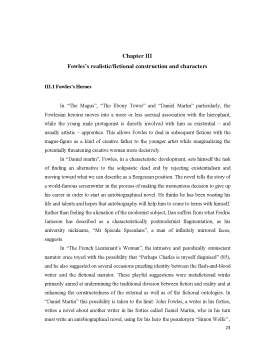Cuprins
- Chapter I.
- Brief biography of John Fowles.1
- I.1. Main works and novels.1
- I.2 Globalization and the novel;
- Novel and fiction in the twentieth century.4
- I.3 Fowles – an universal author.5
- Chapter II.
- The Literary Theory and John Fawles’s Fiction and Illusion.8
- II.1 Illusion vs. Reality.8
- II.2 Comparison between Fowles’s novels.13
- Chapter III
- Fowles’s realistic/fictional construction and characters.26
- III.1 Fowles’s Heroes.26
- III.2 The historical novel.30
- III.3 Fowles’s work about fiction.34
- III.4 About the reliability of the narratives.36
- CONCLUSION.48
Extras din licență
Introduction
Two of the most serious and exhilarating explorations of the Victorian consciousness in recent years have came not from scholars but from novelists. John Fowles and Vladimir Nabokov have more to say about the problems of the nineteenth-century fiction and the relationship between the Victorian and the modern artistic consciousness than innumerable issues of critical and scholarly journals.
The tradition is a venerable one, the novel the first literary form to command from its inception the problems of the form as its subject matter. For the novelists, the most “real” process has always been that of writing, the most “real” creation his created thing. This is not to give short-shrift to the continuing concern of poets, particularly within the post-Renaissance tradition, for the concerns of art within their art.
John Fowles works specially within an historically defined field of contingent reality that determines certain limits and provides certain touchstones for the problems to which he gives fictional form. Specific time and place are factors almost more central to the novel’s effectiveness than anything else. Indeed, the most common and worst kind of historical novel does just that. In many such fictions the period is the strongest and most vivid element in an insipid world in which a set of vague historical “facts” that have little or no fictional significance reduce plot and character to non-existence.
The major indebtedness is to the imaginative literature of the period, the poets for mood, atmosphere and theme, the novelists for narrative devices and characterization.
It is important to evoke Fowles as a great novelist in this paper for his work which set apart from others through the unique script and place. In his work, history take a different form, is more in the fiction than in the fact. Fowles has succeeded in writing fiction, historical novels of sorts, that is true to our knowledge of the period revealed through the period’s imaginative literature. It is as if Fowles wants to redefine “facts” in the light of his attempt to relate the past to the present.
In his novels, John Fowles brilliantly explores all the ideas of what a fictional novel mean, and he also points to a very complex and sophisticated view of the relation between “art” and “life”. It is misleading to speak of “the text” when discussing a Fowles novel, because one of the most salient features in all his work is the presentation of a multiplicity of texts. But this is more than a matter of style: it is central to a basic tenet in Fowles’ work, that “Nothing is real. All is fiction.”
Another fact for one to read and discuss about Fowles in this paper is form the characters point of view. The characters in all Fowles’s novels are involved in a struggle with extension, a struggle to order and recognize the Other, and such a struggle is of course of a fictionist in writing. Behind this lies the desire to create “free” characters, characters who determine their own history, who existentially create themselves in the writing of their own textual histoire.
Although all of John Fowles’s works of fiction grapple with common themes, each new volume has seemed to be fresh creation of an experimental writer determined not to repeat himself. Thus, in this paper I want to examine in detail the relationship between the narrative structure (implying fiction or reality) and the wide-ranging implications of the novel’s treatment of history.
Chapter I
Brief biography of John Fowles
John Fowles – naturalist, philosopher, poet, and novelist – is often considered one of the more important writers since the Second World War because he has succeeded both in being popular and in being esteemed by literary scholars, a feat accomplished by only a small few. Fowles has lived exclusively in his native England since 1966, but his years living abroad in France and Greece and his interest in French literature and thought have had a tremendous impact on his work.
Born in Leigh-on-Sea, Essex, to middle-class parents, Fowles entered the Bedford School near London in 1939, where he studied French and German literature with intensity and depth. After serving in the Royal Marines from 1944-1947, he returned to the study of German and especially French literature, now at New College at Oxford. Moving to France in 1950, he taught English literature for a year at the University of Poitiers. He spent the following two years teaching English at the Anargyrios and Korgialenios School on the Greek island of Spetsai in the Aegean Sea. Here he wrote the “Greek Poems” included in his Poems(1973), and here he met Elizabeth Whitton, whom he later married.
Preview document
Conținut arhivă zip
- fOWLES bIBLIO.doc
- Fowles Contents.doc
- John Fowles' Novels.doc






















































